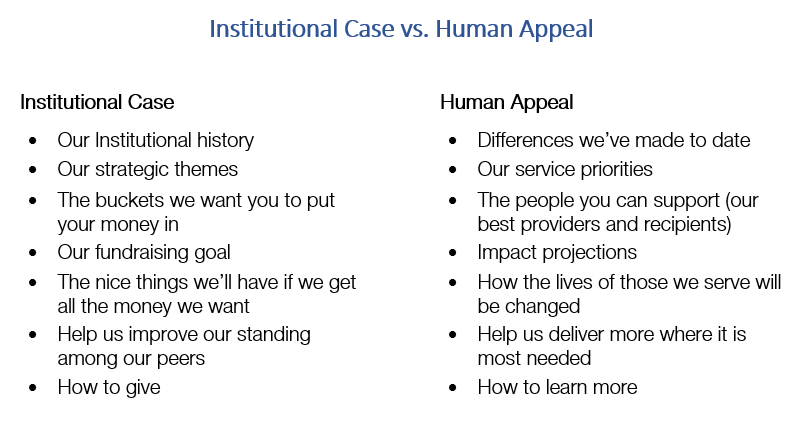We use cookies to ensure that we give you the best experience on our website. By continuing to use this site, you agree to our use of cookies in accordance with our Privacy Policy.
 Login
Login
Your Role
Challenges You Face
results
Learn
Resources
Company
What So Many Fundraising Appeals Miss: People Want to Help People


While fewer numbers of people are giving to institutions, they continue to give in ways they find more interpersonal. They include:
- Grandparents helping put their grandchildren through college
- Family and friends marshaling support for family and friends facing expensive operations
- Neighbors rallying to help neighbors afflicted by natural disasters
- Restaurant patrons giving tips larger than the cost of their meals to help struggling wait staff
- The poor giving generously to the poor, knowing what it means to be down on your luck
People want to help people, to share with those they care about, not just give money. They’re not looking for a tax break. They break out their boats to help rescue souls trapped in floods. They rev up chainsaws to cut up trees blown down by storms. They sit with sick neighbors. They take to the streets when people have been treated unjustly.
We forget the roots of philanthropy can be traced back to small communities where interdependence was essential, whether it was to raise barns, harvest crops, erect churches or build better lives for themselves and their children. More and more people are looking for that kind of philanthropy, for meaning and community.
This is what’s missing from so many institutional appeals. They don’t start with who is to be helped but how donors can help them. So many are overblown, overstated, and over-produced. They don’t allow us to see who we’re helping so we chose to act on our own, to help those we can when we can.
If institutions are to stem donor attrition and win some donors back, they need to back away from the grandiose claims of corporate case and make more human appeals. They should not seek to raise money based on what they want or need unless they can tie it directly to who they could better serve.

Jim Langley is the president of Langley Innovations. Langley Innovations provides a range of services to its clients to help them understand the cultural underpinnings of philanthropy and the psychology of donors and, with that knowledge, to develop the most effective strategies and tactics to build broader and more lasting communities of support. Jim has authored numerous books including his most recent book, The Future of Fundraising: Adapting to New Philanthropic Realities, published by Academic Impressions in 2020.
Related Resources:
- Webinar: 4-Step Process for “Reimagining Fundraising Operations”
- The Seven Principles of Advancement Leadership
- A pep talk for fundraisers like you!
Get smarter with the SmartIdeas blog
Subscribe to our blog today and get actionable fundraising ideas delivered straight to your inbox!
